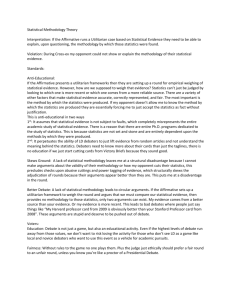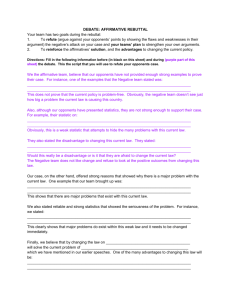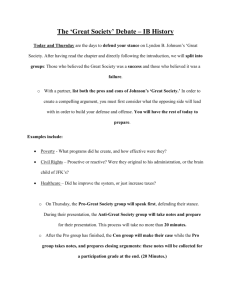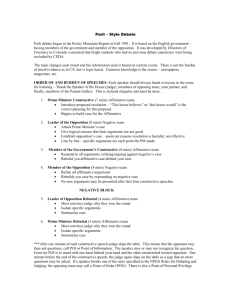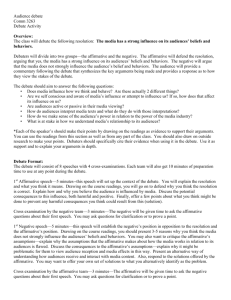Debate rules
advertisement
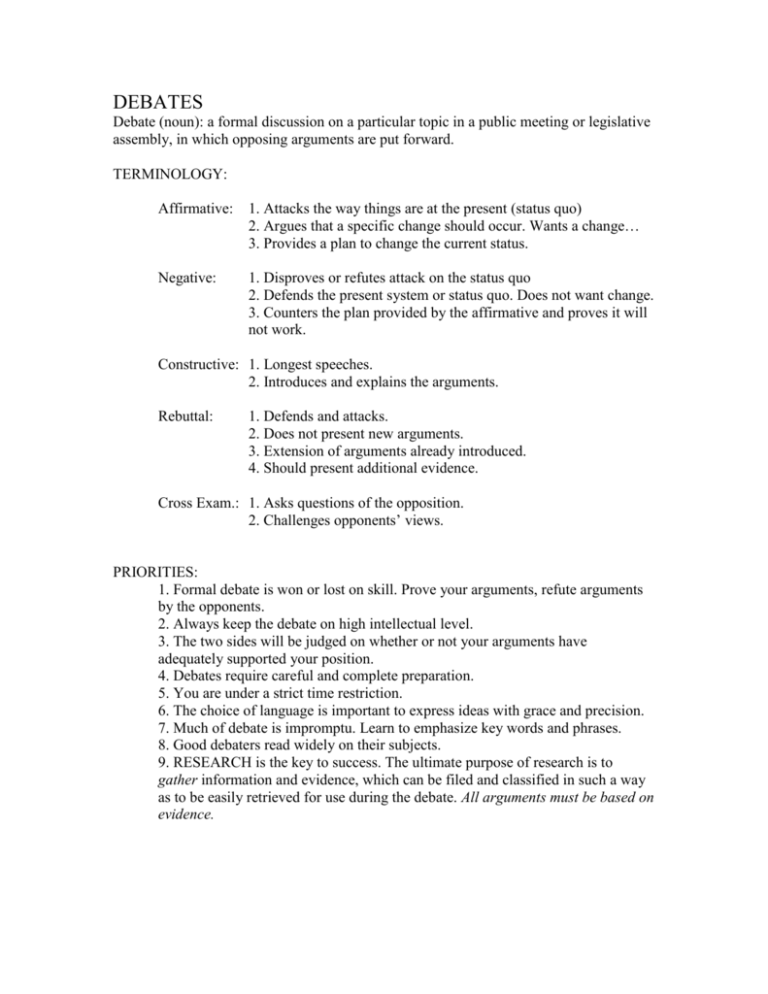
DEBATES Debate (noun): a formal discussion on a particular topic in a public meeting or legislative assembly, in which opposing arguments are put forward. TERMINOLOGY: Affirmative: 1. Attacks the way things are at the present (status quo) 2. Argues that a specific change should occur. Wants a change… 3. Provides a plan to change the current status. Negative: 1. Disproves or refutes attack on the status quo 2. Defends the present system or status quo. Does not want change. 3. Counters the plan provided by the affirmative and proves it will not work. Constructive: 1. Longest speeches. 2. Introduces and explains the arguments. Rebuttal: 1. Defends and attacks. 2. Does not present new arguments. 3. Extension of arguments already introduced. 4. Should present additional evidence. Cross Exam.: 1. Asks questions of the opposition. 2. Challenges opponents’ views. PRIORITIES: 1. Formal debate is won or lost on skill. Prove your arguments, refute arguments by the opponents. 2. Always keep the debate on high intellectual level. 3. The two sides will be judged on whether or not your arguments have adequately supported your position. 4. Debates require careful and complete preparation. 5. You are under a strict time restriction. 6. The choice of language is important to express ideas with grace and precision. 7. Much of debate is impromptu. Learn to emphasize key words and phrases. 8. Good debaters read widely on their subjects. 9. RESEARCH is the key to success. The ultimate purpose of research is to gather information and evidence, which can be filed and classified in such a way as to be easily retrieved for use during the debate. All arguments must be based on evidence. HOW TO LOSE: 1. Be sarcastic and rude. 2. Speak too fast and explain too little. 3. Have speeches only of reading. 4. Use put downs against the other team. 5. Talk out of turn. 6. Fail to do complete research; fail to work hard during the actual debate. 7. Act like you are losing. 8. Waste time. 9. Fail to be prepared. ORDER OF SPEAKERS: First Affirmative Constructive First Negative Constructive Second Affirmative Constructive Second Negative Constructive 4 minutes 4 minutes 4 minutes 4 minutes Cross Examinations (Negative to Affirmative) Cross Examinations (Affirmative to Negative) 3 minutes 3 minutes Negative Closing Statement Affirmative Closing Statement 4 minutes 4 minuts MY TOPIC: ____________________________________________________________ NEGATIVE: ______________________________________________________ AFFIRMATIVE: ___________________________________________________ You are now a member of a debate team. Your team will be graded as a whole. This means that you will be as strong as your weakest link. Be sure that you work together so that all members of your team have an adequate background of the positions and arguments that you will be proposing. 1. There will be two opening statements (first and second constructives) made by your team. This should be 3-5 minutes long and should state your team’s position and the arguments/solutions you are proposing. Responsible Member(s):____________________________________________________ 2. You should have at least 15 questions that can be asked of each of your opponents. These should be on separate sheets of paper or on note cards for easy reference. The questions should be specifically directed to your opponents and should be concise and clear. Responsible Member(s): ___________________________________________________ 3. You should have answers prepared, which will be used to respond to your opponent’s questions. Imagine that you are from the other team and determine what questions may be asked of your team. Responsible Member(s): ___________________________________________________ 4. You should have a final conclusive argument/statement drawn up, which will be written at the end of your debate. This should be no longer than four minutes. Your team should take notes during the entire debate so that you may refer to these during the final presentation of your team’s views. Responsible Member(s): ___________________________________________________ When you have determined who will be responsible for each portion of your team’s debate, it is up to you to prepare yourself for the challenge that lies ahead. Only one team will win this debate. The winning team will: - have a solid background regarding all material - have plenty of evidence to back up claims - use teamwork to teach all in group the important concepts behind specific positions - be creative/psyche out opponents - outclass opponents/never give an answer of “uh….” Good luck! This assignment is worth 80 points and will be graded based upon your ability to debate this issue and convince the judges that you are indeed deserved of your claim.
